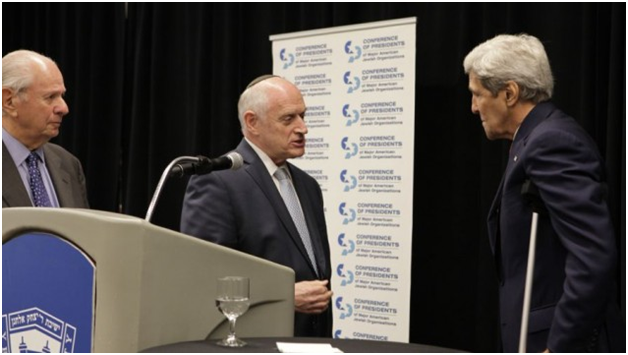What’s behind The American Jewish Divide on the Iran Nuclear Deal?

Council of Presidents of Major Jewish American Organizations (CPMAJO) Pres. Stephen M. Greenblatt, Executive Vice Chairman Malcolm Hoenlein with Secretary of State John Kerry , Manhattan, July 24, 2015. Source: CPMAJO and Times of Israel
Yesterday, Secretary of State John Kerry flew up to New York to brief skeptical leaders of major American Jewish organizations on the Administration-backed Iran Nuclear Agreement announced on July 14th. This followed Thursday’s presentation before a truculent Senate Foreign Relations Committee Iran nuclear review with Kerry, Energy Secretary Earnest Moniz and Treasury Secretary Jack Lew. A provocative question by Senate panel member, Florida Republican Senator Marco Rubio, prompted Kerry to issue a warning to Israel not to sabotage Iran’s nuclear program. Kerry was also caught touting J Street propaganda suggesting that former Israeli security officials from Shin Bet and Mossad considered it a good deal. As reflected in a Times of Israel (TOI) report on Kerry’s briefings, American Jewish leaders expressed concerns about his inability to answer their questions.
However, a poll released Thursday by the Los-Angeles based Jewish Journal suggested that virtually half of American Jews backed Obama on the Iran nuclear deal in contrast to less than 28 percent of all Americans. Thus, confirming the deepening American Jewish divide over support for Israel discussed at length in Ambassador Michael Oren’s memoir, Ally. The TOI article on the Manhattan briefings by Kerry to American Jewish leaders noted the results of the Jewish Journal– sponsored survey:
According to the [Jewish Journal] survey, 49 percent of American Jews support the deal and 31 percent oppose it. Among all Americans, 28 percent support the deal and 24 percent oppose it.

L.A. Jewish Journal survey of American Jews on Iran nuclear deal, July 23, 2015.
The Times of Israel reported comments from participants in the briefings by Kerry:
Among the issues raised were reports of provisions to shorten the embargoes on conventional weapons and ballistic missiles and secret accords dealing with inspections at Iran’s Parchin military base and the possible military dimensions (PMD) of Iran’s past nuclear activities.
“It was a very interesting exchange,” one attendee told the Times of Israel. “We spoke rather frankly and he gave his assessment. Some of the things we agree with and some of the things people disagreed with, but that is the nature of this debate.”
“People remained concerned. He filled in some blanks and on some issues people still feel quite differently,” the attendee added. “Whether you agree with his answers or not, it was an important exchange.”
The meeting with Conference of Presidents involved more than 100 participants from a wide range of Jewish groups including the American Israel Public Affairs Committee (AIPAC), incoming Anti-Defamation League Executive Director Jonathan Greenblatt, Yeshiva University President Richard Joel, and representatives of the Jewish Federations of North America. AIPAC is vehemently opposed to the agreement. It has launched a massive lobbying campaign in a bid to see it stonewalled by Congress, which is currently reviewing the terms of the deal.
Let’s look at the nuances of the Jewish Journal Iranian nuclear deal survey findings:
The LA Jewish Journal Survey asked respondents’ views on “an agreement … reached in which the United States and other countries would lift major economic sanctions against Iran, in exchange for Iran restricting its nuclear program in a way that makes it harder for it to produce nuclear weapons.” Almost half – 49 percent of American Jews – voiced support, and 31 percent opposed. Jews differ from the national population. Of all respondents in our national survey, only 28 percent support the deal, 24 percent oppose and the rest (48 percent) “don’t know enough to say.”
[…]
As a group, Jews hold these supportive views of the agreement, notwithstanding their mixed views regarding its outcomes. Asked whether “this agreement would prevent Iran from developing nuclear weapons over the next 10 years or so,” only 42 percent are somewhat confident or very confident, while 54 percent are not so confident or not confident at all. A slim plurality believes the agreement will lead to more rather than less stability in the Middle East (46 percent versus 41 percent), but a wider margin believes the deal will make Israel more endangered (49 percent) rather than safer (33 percent), almost the same as in the U.S. survey (48 percent versus 32 percent respectively).
But even with their misgivings, Jews overwhelmingly think that, in retrospect, the idea of the U.S. conducting negotiations with Iran was a good one (59 percent) rather than a bad one (19 percent).

Shoshana Bryen, The Jewish Policy Center
Shoshana Bryen of the Jewish Policy Center in our 1330amWEBY interview in a forthcoming August 2015 New English Review article commented about the American Jewish divide:
In the Jewish community there is an element that believes any deal is better than no deal. The President said, “Please think of the alternative to this deal. Think of it,” he said. Clearly, he was leaning in the direction that without the deal, there is war. There is a group of people in the Jewish community that thinks you must do anything you can, to prevent war. Anything, everything. If you give up sanctions and accept demands its okay, because you’re not having war. There’s another group of people in the Jewish community, that says, if you give up everything, you’re going to end up with war anyway, but from a less advantageous position.
Ted Belman of the Jerusalem based blog Israpundit was “shocked” by the L.A. Jewish Journal survey findings pointing to the Shmuel Rosner Journal article, The growing divide between Jewish Americans and Jewish Israelis.
Rosner opined:
The Jews of Israel oppose the agreement with Iran. The Jews of America support it. The just-released LA Jewish Journal survey turns an assumption into a fact: The two largest Jewish communities cannot agree on a major world development that could significantly change the state of the Jewish state.
Israel will discover today — much to many Israelis’ surprise (because they don’t much understand American Jews) — that it cannot count on the majority of American Jewry to fight the battle against the agreement alongside it. A majority of American Jews will discover today that amid all the noise made by opponents of the deal, not much has changed for them as a group: They support President Barack Obama; they vote Democratic; they approve of the agreement. American Jews are just like Americans, as sociologist Steven Cohen, who oversaw the survey, writes: They are all skeptical about the deal, but their politics dictate the way they ultimately see it.
My response to Belman was The Jewish Journal publishers hew to a reform movement precept-to repair the world. Shmuel Rosner is a left-wing Israeli journalist who made career of viewing American Jews through that lens including opposition to Bibi and the settler movement. If you look at who consulted on this survey – the West Coast Reform seminary of UAHC- there are likely two biases in both framing questions and population sampling. The first is support for J Street among the reform movement leadership and seminary academics. There are 600 members of the J Street Rabbinic Cabinet largely drawn from the Reform movement pulpits in the U.S. The second is the liberal reform readership of theJewish Journal editions across the U.S. Increasingly, it seems liberal Jews view Israel as alien to their assimilationist values. That meme comes through in Michael Oren’s memoir.Ally.
Essentially, the Reform movement in the U.S. has returned to its traditional pre WWII anti- Zionist roots.
EDITORS NOTE: This column originally appeared in the New English Review.


